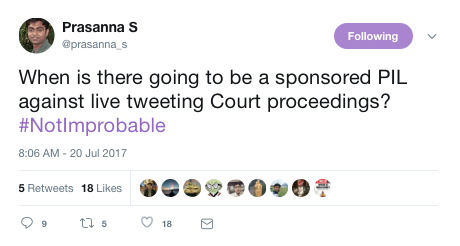Vakasha Sachdev (@VakashaS) recently commented on ‘Live Tweeting Court Proceedings’:
“A stream of live tweets… recently went viral in Indian Twitterverse. Surprisingly, these tweets had nothing to do with Shah Rukh Khan or Baahubali or IPL…
What they related to was far more unexpected – constitutionality of a tax law amendment. Basically, Gautam Bhatia and Prasanna S took 6 days of complex arguments on constitutional and taxation law, argued by some of India’s most eminent, and tweeted concise, understandable summaries of these in real time.“
Indeed those 6 days, saw monstrously talented, Former Rhodes Scholar, Gautam Bhatia [@gautambhatia88] manically tweeting. A staggering number of people were cued in. One would think this would unquestionably be a public good. But, of course, there was criticism.
_____
After the Supreme Court compound wall, there is a road called Bhagwan Das Road. After crossing the road, there is a huge car parking and thereafter the building of Indian Law Institute. Within that compound of Indian Law Institute, is the Cigarettes & Refreshment Kiosk of Dharam Chand.
SC in 2015 refused to allow such a kiosk for ‘security reasons’. It said:
“Merely because of the contention of Appellant and Respondents that after the Bomb Blasts took place in Delhi High Court compound in 2011, no such incident happened till date, it cannot be presumed that such incident will not happen in a near future. Court cannot assume and presume that there is no threat to the safety and security of Supreme Court and its vicinity and allow Appellant to continue the said business.”
When SC cannot ‘assume and presume’ that there is no threat to its safety and security, how can it allow mobile phones and other such electronic devices inside its Courtrooms?
_____
On 13.05.2017, the question had its first testing:

This debate is sure to gain further momentum.

I am reminded of a scene in Infernal Affairs [2002, dir: Andrew Lau & Alan Mak] where a cell phone is used to send a Morse Code signal. GB’s efforts are laudable. But while encouraging ‘Live Tweeting’ we must not forget to assess the security threat those tweeting phones pose to Supreme Court.
_____
VS offered a similar solution, “to step up security to ensure that only those people allowed to take mobile phones in are able to do so” [See Box].
Earlier in time, those engaged in pure Court Practice were discouraged to academically contribute to journals. It is hard to find articles written by Senior Advocates, when they were young and restless. Arvind Datar had exceptionally set a goal for himself to write a nationally known law book by his 30th Birthday.
Times have changed. Some run law blogs such as IndiaCorpLaw, Law and Other Things, Spicy IP. There are websites too like Bar & Bench, Legally India, Live Law, manned by Advocates, whose reportage of Court Proceedings have value. Indeed many ‘gown and band waalas‘ travel to Court everyday not to argue or assist but to observe and report. In circumstances such as these, it is often impossible to distinguish between a Journalist, with his education in Journalism, sitting in the Visitor’s Box and an Advocate, with his education in Legal Theory and Method, sitting in the Advocate’s Box. And yet in practice, the latter carries his mobile phone inside a Courtroom, without sanction or shame, and the former has his temporarily confiscated.
_____
I intuitively conclude, mobile phones inside Courtrooms undermine the judicial process. One should be not be allowed to record, broadcast or communicate with outsiders while inside Courtrooms, without specific permission from Court itself. Even if mobile phones are part of our free speech rights, those rights should stand forfeited in the name of security, sanctity and a simple direction of Court.
You must be logged in to post a comment.